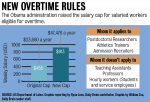More UCLA employees will be eligible for overtime pay due to updated pay rules released May 18.
The United States Department of Labor released new rules stating executive, administrative and professional salaried employees making less than $47,476 a year now qualify for overtime pay under the Fair Labor Standards Act. The previous threshold was $23,660 a year.
Postdoctoral researchers, admissions recruiters and athletic trainers, among other employees, will now be eligible for overtime pay, according to the rules.
About 3,000 postdoctoral scholars are paid less than the overtime threshold, said Anke Schennink, the president of the United Auto Workers Local 5810, a union representing postdoctoral researchers.
The rules exclude teaching assistants, tutors, professors and lecturers.
Universities can raise employees’ salaries above the threshold to avoid paying them overtime.
Melissa Agnello, a UCLA postdoctoral scholar in oral biology, said the overtime pay may not seem like a lot of money to most people, but she thinks it could help students pay the expensive rent in Westwood and the rest of Los Angeles.
She said the average postdoctoral scholar works 50-52 hours a week and the potential overtime pay may incentivize employers to raise salaries above the threshold.
“Research is hard to conduct based upon hours,” Agnello said. “That is not the nature of the work. Some days there is more to do than others.”
Agnello said she thinks some postdoctoral scholars felt underappreciated because some UC officials did not support the new rules when they were in development.
Last September, Gary Falle, UC associate vice president for federal governmental regulations, filed a petition to the Department of Labor asking for an exemption from the overtime rule.
Falle said in the petition he thought the proposed overtime rules would increase financial strain on the UC budget.
Immediate implementation of the overtime rule would stop the University from hiring postdoctoral students, which would impede current research, he said in the petition. He added the University does not have a system in place to calculate overtime pay and did not budget for the change.
“A phased-in approach would allow the University to plan and budget for the increase in order to minimize the impact on ongoing research,” Falle wrote.
Schennink said she thinks the UC’s claim that the new rules would decrease hiring of postdoctoral scholars is not fact-based.
“Our negotiations in 2010 increased salaries by 17 percent per year, but it did not lead to a decrease in the number of postdoctoral scholars,” she said. “If anything, the number of postdoctoral scholars has continued to increase.”
Some athletic trainers would also be affected by the new rules.
Josh Rupprecht, UCLA athletics spokesperson, said in an email statement that the athletics human resources staff is working with the UC Office of the President to understand the impact of these new rules on their division. He added athletics will follow more specific guidelines as they are released.
Michelle Moyer, director of business and legal affairs for Associated Students UCLA said in an email statement the new overtime rules will not impact students employed under ASUCLA.
ASUCLA student employees are hourly workers who already receive overtime pay and will continue to do so under the new rules, according to the Labor department.
Zeke Trautenberg, a leader of the academic student employees union, UAW 2865, said in an email he thinks teaching assistants, tutors and readers cannot easily appeal for overtime pay and are excluded from the new rules because society does not value the contributions of teachers.
Claire Doan, UC spokesperson, said the UC is still assessing the impact of the new rules.
The overtime rule will go into effect Dec. 1, 2016, according to Moyer.
